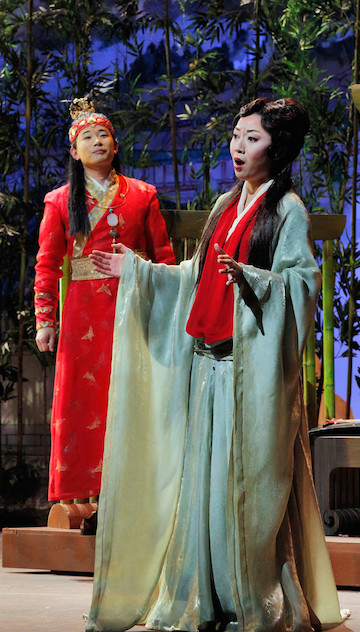
Dream of the Red Chamber
Any moment in our lives is a distillation. Of our personal pasts, our societal setting, the slow evolution of the natural world. Theater, and arts in general, make their statements and derive their power from performing distillations of these impossibly large landscapes of life and living. The Dream of the Red Chamber, which recently world premiered at San Francisco Opera and continues until September 29, has many things to distill – a 2,500 page, 250-year-old Chinese novel known as a classic of world literature, for one.
Even more difficult, though, it strives to condense and meld an ancient cultural tradition into a younger bolder cultural perception. It does so with great and careful restraint. Ultimately, its success is determined individually by each viewer, and that in itself is a testament to the opera’s complexity and to its viability.
The opera takes a central and universal motif from one of the main threads of the novel, that of the love between a young spoiled man, Bao Yu, from an ancient and admired family and his cousin Dai Yu, who has been orphaned and is now dependent on her cousin’s family to protect and nurture her.
What we know from the opera’s opening, a framing of the story by a monk, is that the two lovers are soul mates, who began their journey in creation as a sentient stone and a flower. For 3,000 years the stone sheltered and nourished the flower, collecting dew in its craggy surface. Desire forces them to ask for reincarnation, so that they can experience love in a physical and human way. The monk (an energetic and humorous Randall Nakano) chides them and warns against reincarnation. He portends unhappiness in the material world.
Reality and illusion are a central motif to this story and to the opera. The name of Bao Yu’s family – Jia – is a homophone for the word reality. Throughout the opera, illusions provide the twists in the stately plot. And pure love is undermined again and again by political maneuverings and human greed.
Music and voice are the true drivers of plot though. The composer Bright Sheng’s music is rich and orchestral, firmly seated in Western symphonic traditions, but graced with Chinese flourishes – rapid, punctuating percussion and an ethereal accompaniment on a Chinese zither, or qin, to Dai Yu’s first act aria. Brass supports the percussion for dramatic oomph. At times the music has a cinematic quality, opening out in large washes of sound.
The singing also blends traditions. The voices of the ingénue characters in Chinese opera are set high; the men singing in a kind of falsetto. Bao Yu’s voice is high but not artificially so, and tenor Yijie Shi sings the role brilliantly, his vocal color clear and with a smooth warmth that falls just short of bright. Soprano Pureum Jo negotiates the stratospheric highs of the character Dai Yu with sure grace. Her upper register is exquisitely pure, she floats the sound, then slowly increases the dynamic until the sound shimmers in the air. Wow.
Since the opera is set in the Red Chamber, or the women’s quarters, the soundscape is mostly female, a refreshing change from the mostly male voices that dominate European opera. Contralto Qiulin Zhang sings the matriarch Granny Jia, and Yanyu Guo sings the obliging Aunt Xue. Mezzo Irene Roberts sings a down-to-earth Bao Chai, the woman competing for Bao Yu’s love, and Hyona Kim sings the ambitious and conniving Lady Wang. Karen Chia-ling Ho sings the role of Princess Jia, caught in the political web between the ruthless Emperor and her family.
To add to it all are the opulent sets and costumes of Production Designer Tim Yip. The sets carry through the theme of illusion. Representations of hand-painted scenes, done with the light impressionistic touch of Chinese landscape painting, are reproduced on sheer cloth and divided into modular panels. These are suspended by ropes, which move the panels into different configurations at the beginning of each scene. The effect is one of a breathing living backdrop of landscape and the natural world. The moment the panels appear, shifting seamlessly across the back of the stage is another wow! moment in the opera.
Gorgeous is the only word for the costuming, which uses yards and yards of silk, decorated with glittering embroidery and using color to define the character’s personality and intentions.
All in all, the opera is a massive achievement. One crystalizing the world we live in, here and now, there and then, on the rim of the beautiful and changeable Pacific.
– Jaime Robles
Caption: Yijie Shi as Bao Yu and Pureum Jo as Dai Yu in Sheng and Hwang’s “Dream of the Red Chamber” at the San Francisco Opera. Photo by Cory Weaver/San Francisco Opera.
